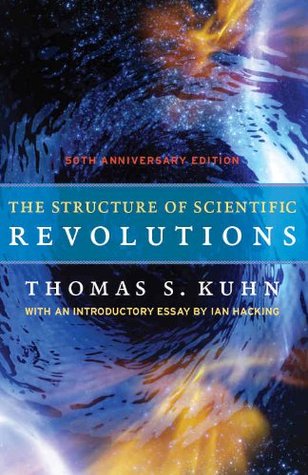More on this book
Community
Kindle Notes & Highlights
Read between
September 9 - October 10, 2021
We are all deeply accustomed to seeing science as the one enterprise that draws constantly nearer to some goal set by nature in advance. But need there be any such goal? Can we not account for both science’s existence and its success in terms of evolution from the community’s state of knowledge at any given time? Does it really help to imagine that there is some one full, objective, true account of nature and that the proper measure of scientific achievement is the extent to which it brings us closer to that ultimate goal? If we can learn to substitute evolution-from-what-we-do-know for
...more
When Darwin first published his theory of evolution by natural selection in 1859, what most bothered many professionals was neither the notion of species change nor the possible descent of man from apes. The evidence pointing to evolution, including the evolution of man, had been accumulating for decades, and the idea of evolution had been suggested and widely disseminated before. Though evolution, as such, did encounter resistance, particularly from some religious groups, it was by no means the greatest of the difficulties the Darwinians faced. That difficulty stemmed from an idea that was
...more
One of the fundamental techniques by which the members of a group, whether an entire culture or a specialists’ sub-community within it, learn to see the same things when confronted with the same stimuli is by being shown examples of situations that their predecessors in the group have already learned to see as like each other and as different from other sorts of situations.
What makes the integrity of perception worth emphasizing is, of course, that so much past experience is embodied in the neural apparatus that transforms stimuli to sensations. An appropriately programmed perceptual mechanism has survival value.
The practice of normal science depends on the ability, acquired from exemplars, to group objects and situations into similarity sets which are primitive in the sense that the grouping is done without an answer to the question, “Similar with respect to what?” One central aspect of any revolution is, then, that some of the similarity relations change. Objects that were grouped in the same set before are grouped in different ones afterward and vice versa. Think of the sun, moon, Mars, and earth before and after Copernicus; of free fall, pendular, and planetary motion before and after Galileo; or
...more
The men who experience such communication breakdowns must, however, have some recourse. The stimuli that impinge upon them are the same. So is their general neural apparatus, however differently programmed.
Briefly put, what the participants in a communication breakdown can do is recognize each other as members of different language communities and then become translators.
Since translation, if pursued, allows the participants in a communication breakdown to experience vicariously something of the merits and defects of each other’s points of view, it is a potent tool both for persuasion and for conversion.
To persuade someone is, I take it, to convince him that one’s own view is superior and ought therefore supplant his own. That much is occasionally achieved without recourse to anything like translation. In its absence many of the explanations and problem-statements endorsed by the members of one scientific group will be opaque to the other. But each language community can usually produce from the start a few concrete research results that, though describable in sentences understood in the same way by both groups, cannot yet be accounted for by the other community in its own terms. If the new
...more
The conversion experience that I have likened to a gestalt switch remains, therefore, at the heart of the revolutionary process. Good reasons for choice provide motives for conversion and a climate in which it is more likely to occur. Translation may, in addition, provide points of entry for the neural reprogramming that, however inscrutable at this time, must underlie conversion. But neither good reasons nor translation constitute conversion, and it is that process we must explicate in order to understand an essential sort of scientific change.
A scientific theory is usually felt to be better than its predecessors not only in the sense that it is a better instrument for discovering and solving puzzles but also because it is somehow a better representation of what nature is really like. One often hears that successive theories grow ever closer to, or approximate more and more closely to, the truth. Apparently generalizations like that refer not to the puzzle-solutions and the concrete predictions derived from a theory but rather to its ontology, to the match, that is, between the entities with which the theory populates nature and
...more


